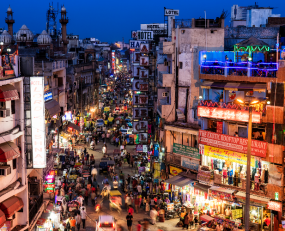
DP World has just finalised an agreement to build a new, large container terminal in India. On Friday 25th of August the Dubai based terminal company signed a concession contract with the Deendayal Port Authority to construct a “new mega-container terminal at Tuna-Tekra” on the Gulf of Kutch in Gujarat. The terminal is planned to be able to handle 2.19m TEU per annum.
The project is a joint venture between DP World and India’s National Investment and Infrastructure Fund, which DP World describes as “India’s collaborative investment platform anchored by the Government of India”. DP World outlines the concession for the terminal as being “on a Build-Operate-Transfer (BOT) basis for a period of 30 years with the option to extend for another 20 years”.
The terminal will be capable of “handling next-generation vessels carrying more than 18,000 TEUs. As part of this concession agreement the berth can be further extended to 1,375 m”, so presumably DP World is planning to adapt the facility to handle ultra-large vessels of over 20,000 TEU. Crucially there are also plans to develop both road and rail capacity through what DP World calls “Dedicated Freight Corridors”, with promises by the Indian government to quadruple rail capacity to the location.
The market for Indian port facilities has become quite fast changing over the past few years. After struggling to provide sufficient capacity for its growing economy for several years, India has begun to create world-class facilities. Notable in this is the port of Mundra, where the Adani Group has built what is now India’s largest container port complex. Mundra is further-down the Gulf of Kutch. These ports are also designed to act as a catalyst to improve land-side logistics and to attempt to improve India’s connection to the global economy. It is worth noting that both these port developments are on the coast of Gujarat, north of the previously dominant container terminal cluster in Mumbai, new locations that give better access to northern India, including the capital, Delhi.
Author: Thomas Cullen
Source: Ti Insights
Supply chain strategists can use GSCi – Ti’s online data platform – to identify opportunities for growth, support strategic decisions, help them stay abreast of industry trends and development, as well as understand future impacts on the industry.
Visit GSCI subscription to sign up today or contact Michael Clover for a free demonstration: [email protected] | +44 (0) 1666 519907